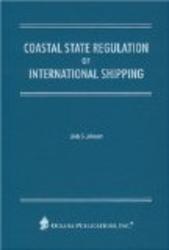Description
This book looks at coastal states' interests in regulating international shipping and how this has changed over time. It discusses the provisions of the 1982 U.N. Law of the Sea Convention and how a coastal state may regulate shipping while still abiding by the law.
Much has been written on the navigation rights and freedoms set forth in the Law of the Sea Convention. This book takes a fundamentally different approach to these rights and freedoms. It looks at international shipping from the perspective of Coastal States and their desire to protect their resources and marine environment from damage by international shipping. As the potential risk of damage by shipping increases because of the increases in the volume and composition of ships and the varying array of cargo carried, Coastal States' interest in protecting their resources and environment will only become more acute and they will seek to act. It addresses the four major jurisdictional areas of most interest to Coastal States: the port the territorial sea the contiguous zone the exclusive economic zone Three specific examples are used to illustrate the points raised in the discussion: ship strikes of the North Atlantic right whale, the unwanted transfer of harmful aquatic organisms and pathogens through discharges of ships ballast water, and wastewater discharges from cruise ships. The conflict between a Coastal State's interest in regulating navigation off its coast and ship owners' interest in limiting such regulation is an old yet ongoing one. Shipping accounts for 95% of world trade transportation, yet it presents a risk of damage to the marine environment as the volume and composition of ships and the varying array of cargo carried increases. Coastal States have an obvious interest in participating in global trade and thus in shipping; however, this interest does not necessarily supersede their desire to regulate shipping in order to protect their resources and the marine environment. This book explores the significant changes that have taken place over the last two decades in the shipping industry and Coastal States' interests. It reviews the provisions of the 1982 U.N. Law of the Sea Convention with regard to the actions a Coastal State may take to regulate international shipping, while remaining within the boundaries of the Law of the Sea Convention and customary international law. This volume provides Coastal States with guidance in protecting their interests and yet recognizes the rights and duties accorded to navigation interests by the Treaty.
